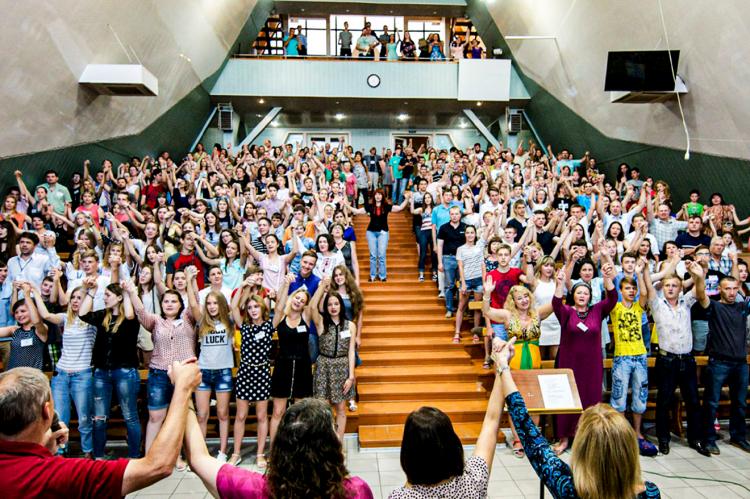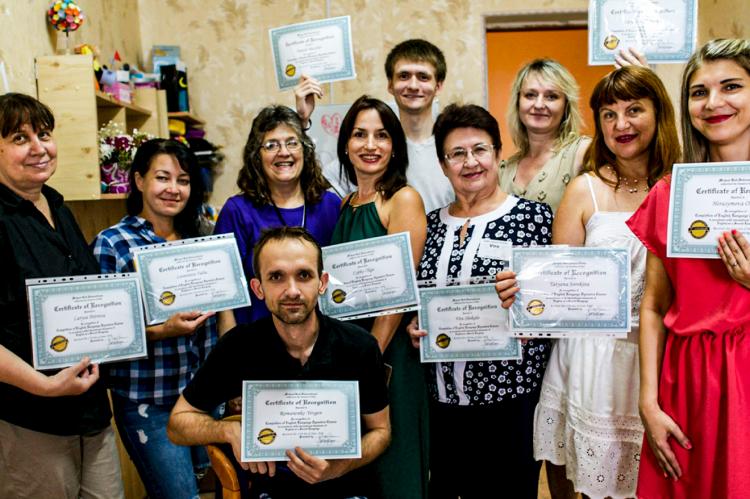On a wing and a prayer: Mission trip takes group to war-torn Ukraine
AS MANY DO, Betty Bynum has summer travel plans. Her destination, however, is far from your typical tourist hotspot.
If all goes according to plan, Betty will leave on Tuesday, June 28 for a flight to Warsaw, Poland, where she will join a team of about 15 other volunteers—most of them from Texas—destined for Lviv, a city in eastern Ukraine. They will spend the next month working with local churches, teaching English to Ukrainian citizens.
The group is led by Michael and Jan Gott, with Michael Gott International (mgi.global), a nonprofit evangelical association. Gott’s connection with Ukraine took root back in the 1960s, when he was invited to preach at some churches in what was then part of the Soviet Union.
“He just fell in love with the people,” Betty said, “and God put that on his heart that it was what he was supposed to do. He is so wellknown and has such a good reputation—even in the government leadership—that he can go places and do things that the average American can’t go do.”
Since then, MGI has organized regular mission trips to Ukraine. During a typical mission to Ukraine, volunteer teams teach English courses that are integrated with Bible teachings, music worship, and evangelistic services that reach thousands.
The ministry has also orchestrated Christian music concerts in conjunction with The Singing Men of Texas, a group of Southern Baptist music ministers and pastors that has participated in evangelistic projects at the invitation of the Ukraine Baptist Union.
It is through that ministry that Betty and her husband, Bob, first became involved. Bob is the pastor of the Locust Grove Baptist Church, where he has served since 2018, and is also a professional piano tuner. In her daily life, Betty teaches piano and guitar to students in this area, both online and in person.
Bob joined The Singing Men in 2011, while living in Dallas, and has since taken several trips to Ukraine with the group.
“The men go sing a concert in a local concert hall or a church,” Betty said. “Michael preaches a little bit, and then they sing, and it’s that kind of evangelistic event.”
The Ukraine people have an incredibly rich cultural history, Betty said. They love choirs, but they particularly love men’s choirs.
“If it’s a men’s choir, and it says America on it, they are going to fill every nook and cranny in a concert hall,” she said. “When we were there—and we went twice with that group in 2012—both times, concert halls that would seat 800 would have 1,000 people packed into them. If the pew holds 10 people, they’ll pack 15 in. They don’t care.”
“It was one of the most fascinating things I’d ever seen,” she said.
In the last 30 years, MGI has offered at least 150 schools teaching the English language to Ukraine citizens. Betty saw those classes as an opportunity to put her gift of teaching to use.
Her first trip to Ukraine was in 2016. Since then, she has been a teacher in 10 English events there under the auspices of MGI.
When Ukraine was invaded by Russian military forces on Feb. 24, MGI’s mission expanded to include taking food and supplies from Poland into the country on a daily basis.
Ukraine has been under siege now for 120 days. The most intensive attacks are concentrated in the Donbas—Ukraine’s eastern region. As recently as mid-April, however, the western city of Lviv, which has become a major gateway for NATO-supplied weapons into the country, was a target of missile strikes.
A total of 10,260 civilian casualties have been reported in the country, according to the United Nations, though the real numbers could be much higher. More than 13 million people have fled their homes since the invasion began. Almost five million have fled to neighboring countries, while at least eight million are believed to be displaced inside Ukraine itself.
“As the Russian invasion of Ukraine continues,” MGI said in its mission statement, “so will our efforts to provide needed humanitarian aid … for the resettlement, health, and well-being of Ukrainians.”
Betty said her experience as a veteran teacher who has been to Ukraine many times uniquely qualified her for this mission. “All of us are veteran teachers, who have gone multiple times,” she said. “We were all asked specifically to go.”
“This is not something that’s open to somebody who just wants to go on a mission trip… because there are too many unknowns going into this situation,” she said, adding, “We are walking into a war zone. All of us are extremely flexible. We’ve learned how to do that over the course of a lot of years.”
The people fleeing from Ukraine do not know where they will end up. Some go to Germany, some to Poland and Latvia, and some to Finland—all countries which have in common that much of the population speaks English.
Betty said the group will be teaching English to students with a range of knowledge, from beginners to those who are fairly fluent, but who welcome the opportunity to improve their skills.
“Once someone registers for the school, they get a preliminary testing,” she explained. “They get split up into two groups: the more basic beginner-type groups, and the ones who maybe worked for international companies and just want more time to spend with native speakers.”
“We have a set lesson plan as a guide to what we do,” she said. “Every time we go into a place, it’s going to be a little different. But it’s amazing how much they learn.”
Most of the Ukrainian people tend to speak several languages. “Very, very rarely have I run across any students who don’t already speak three or four languages fairly fluently,” she said, adding that most speak both Russian and Ukrainian. Many speak Polish or German or French. “English may be their seventh or eighth language.”
Betty clearly admires the Ukrainian people, describing them as “incredibly tenacious.”
“I laughed when Putin said he was going to go conquer the whole country in three days,” she said, and remembered thinking, “You obviously have no clue as to who you’re going up against.”
“One of the things I’ve noticed,” she said, “is that the younger they are—and I mean 30 and under—they have the resiliency and the tenacity, but none of them have the communist experience. The older ones remember living under communism, so they’re a little more stoic, less excitable—at least, on the surface.”
“Just the fact that so many are still in the Mariupol area…” Betty said, pausing, “I realize that part of it is they can’t get out and haven’t been able to, but a lot of them haven’t even tried.”
Betty said her group will be on the far western side of the country, which is probably one of the safest areas. “I have no doubt that I’m supposed to be going,” she said. “But there is a very conscious part of me…that I’m walking into a war zone. And there’s always the chance that you’re walking into a place and you’re not coming back home.”
“But that’s just life,” Betty said.
The situation is more complicated, she said, because the group has been told that they must carry everything they need in Ukraine in a backpack. Usually, she said, she carries all of her lesson plans in 2- or 3-gallon Ziploc bags.
“Each lesson is separated out, and I have all of my cue cards, all of the stuff I stick on the wall, in a bag,” Betty explained. “We call them our 50-pounders. It’s usually stuffed to the gills between clothes and supplies.”
Now, she said, “How do I change how I teach, to use a few little pieces of paper and an iPad?”
One of her favorite activities with children is using balloons with stuff inside. “You pop it,” she explained, “and follow the instructions. But I’m thinking it’s not a good idea to pop balloons now.”
Betty is philosophical about the danger she may encounter. When she told her husband about her plan, she anticipated some resistance. “I was really kind of surprised,” she remembered. “I kind of expected him to say, ‘I don’t know if I like that.’”
Instead, Bob told her, “I think you need to go,” Betty said, adding,“I really had to take that into account as part of my prayer time.”
Betty was quiet for a moment, before continuing. “We have a saying that gets printed on all of the posters that get put out in the country,” she said. “It says, ‘The rest of your life can be the best of your life.’ That means serving God is part of your life.”
“Our goal is never to stuff Jesus down anybody’s throat, because he won’t fit,” she continued. “Ultimately, the choice is up to them. But it’s our responsibility to give them everything we know about that choice, so that they can make their own intelligent decision.”
“Unfortunately, a crisis always opens people up to the Gospel—more so than normal everyday life. And they are in the middle of a crisis. We don’t hide the fact that we are Christians, but we don’t talk about it upfront. This is about building the relationship, to get them ready to hear it.”
Betty closed by saying, “There is a point where you have to earn the right to share your faith. I am a firm believer in that. Whatever context that takes, there is a reason. Normally, the reason new people go into churches is that they’ve either already been involved, they’ve moved to a new location, or they are in the middle of a crisis. They will go to the church where somebody who has helped them already is because they know they can trust it.”
“There may be days when every single lesson plan we have goes out the window,” she said. Asked if she is ready for that, Betty responded, “If I’m not, I’ve got God with me, who is. So yeah, I’m ready.”
To learn more about Michael Gott International, go to https://www.mgi.global.





